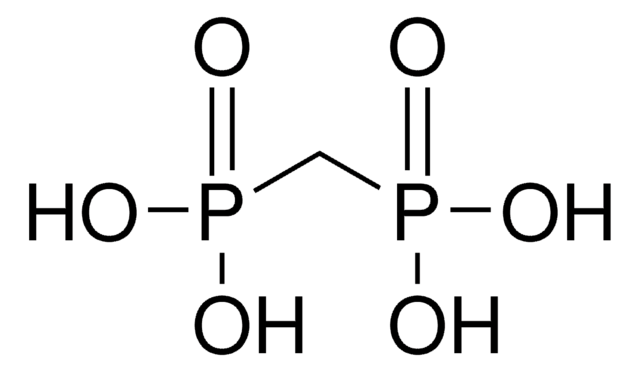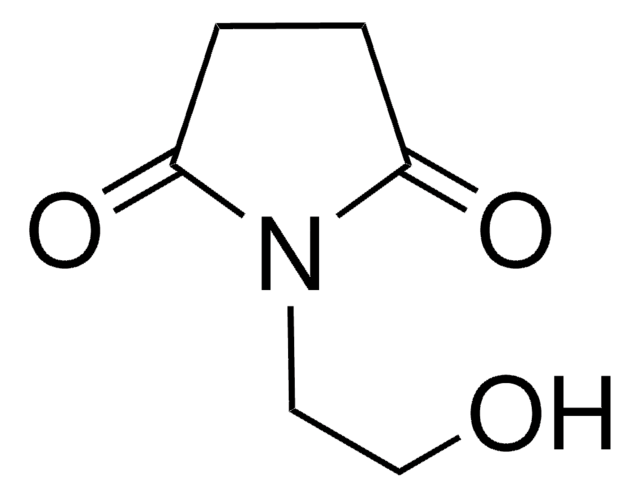H4271
N-(2-Hydroxyethyl)iminodiacetic acid
≥95% (titration)
Synonym(s):
Ethanol diglycine
Sign Into View Organizational & Contract Pricing
All Photos(2)
About This Item
Linear Formula:
HOCH2CH2N(CH2COOH)2
CAS Number:
Molecular Weight:
177.16
Beilstein:
1780628
EC Number:
MDL number:
UNSPSC Code:
12352100
PubChem Substance ID:
NACRES:
NA.22
Recommended Products
Quality Level
Assay
≥95% (titration)
mp
178 °C (lit.)
SMILES string
OCCN(CC(O)=O)CC(O)=O
InChI
1S/C6H11NO5/c8-2-1-7(3-5(9)10)4-6(11)12/h8H,1-4H2,(H,9,10)(H,11,12)
InChI key
JYXGIOKAKDAARW-UHFFFAOYSA-N
Looking for similar products? Visit Product Comparison Guide
Related Categories
General description
N-(2-Hydroxyethyl)iminodiacetic acid is an organic building block shows different structural motifs. It has 3 bridging moieties that leads to the connects with rare earth metal centers so this can act as both bridging ligand as well as the chelating agent.
Application
N-(2-Hydroxyethyl)iminodiacetic acid can be used in the synthesis of polymeric solids.
Signal Word
Warning
Hazard Statements
Precautionary Statements
Hazard Classifications
Eye Irrit. 2 - Skin Irrit. 2 - STOT SE 3
Target Organs
Respiratory system
Storage Class Code
11 - Combustible Solids
WGK
WGK 3
Flash Point(F)
Not applicable
Flash Point(C)
Not applicable
Personal Protective Equipment
dust mask type N95 (US), Eyeshields, Gloves
Choose from one of the most recent versions:
Already Own This Product?
Find documentation for the products that you have recently purchased in the Document Library.
Lanthanide coordination polymers based on flexible ligands derived from iminodiacetic acid
Puentes, et al.
Polyhedron, 170, 683-689 (2019)
Y Inoue et al.
Bioscience, biotechnology, and biochemistry, 60(5), 811-817 (1996-05-01)
A ras oncogene-amplified recombinant BHK-21 cell line (ras-rBHK-IgG) has been established, and was shown to hyperproduce the recombinant IgG chimeric human monoclonal antibody (hMAb) AE6F4, which recognizes lung cancer cells. We found that the ras-rBHK-IgG cell could be easily cultured
A novel two dimensional samarium (III) coordination framework with N-(2-Hydroxyethyl) iminodiacetic acid and oxalate ligands: Synthesis, crystal structure and magnetic property
Zhao, et al.
Inorganic Chemistry Communications, 14, 1928-1931 (2011)
Namgoo Kang et al.
Chemosphere, 63(10), 1685-1698 (2005-12-06)
The Fenton's system is applied to the destruction of perchloroethylene (PCE) present as a dense non-aqueous phase liquid (DNAPL) in soil slurry systems; the initial concentration of PCE was 45 times higher than its aqueous solubility. Studies were conducted in
Namgoo Kang et al.
Chemosphere, 61(7), 909-922 (2005-11-01)
Fenton's destruction of benzene, toluene, ethylbenzene, and xylene (BTEX) was investigated in soil slurry batch reactors. The purpose of the investigation was to quantify the enhancement of oxidation rates and efficiency by varying process conditions such as iron catalyst (Fe(II)
Our team of scientists has experience in all areas of research including Life Science, Material Science, Chemical Synthesis, Chromatography, Analytical and many others.
Contact Technical Service








